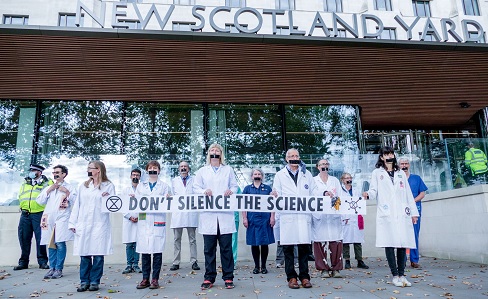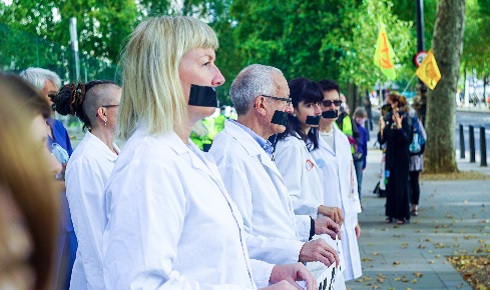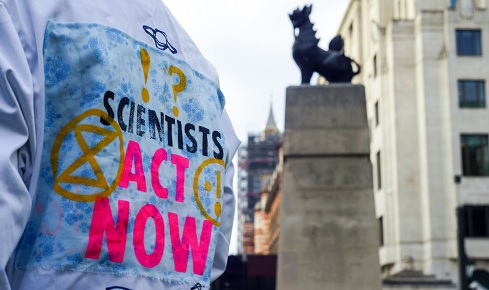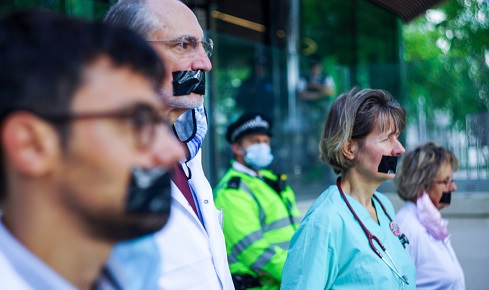"I once believed the people making decisions would listen to scientists - that is not true"

Former ecologist Emma Smart talks to Emma Wrake AMRSB about her recent arrest at an Extinction Rebellion protest, and why more and more scientists are joining the activist group
Earlier this month, Emma Smart became the latest member of ‘XR Scientists’ (a group of scientists and former scientists within the Extinction Rebellion Activist movement) to be arrested. Footage shows her attempting to give a speech outside the Department of Health in London about the impact of animal agriculture on ecosystems and public health, before being surrounded by police. After refusing to move her protest to Parliament Square, she was then lead away and arrested, and police confiscated her speech, loudspeaker and microphone.
Smart, who spent nine years working to conserve freshwater species in the Middle East and discovered a new species of Arabian freshwater fish (Garra Smarti), says she became disillusioned with what she could achieve in conservation through research and NGOs, and has been an activist for the past year.
The XR Scientists group now has over 250 active members, some of whom were featured in a Biologist article on science and activism in June.
Smart is currently challenging her arrest and says the police are using powers to thwart protests and ‘gag’ scientists from speaking at protests.
 Emma Smart, centre, joined by other members of the XR Scientists group in a protest outside New Scotland Yard following her arrest. Above images courtesy of Vincenzo Lullo.
Emma Smart, centre, joined by other members of the XR Scientists group in a protest outside New Scotland Yard following her arrest. Above images courtesy of Vincenzo Lullo. Can you explain why you got involved with XR?
From a very young age, as a child collecting beetles and butterflies, my life has been dedicated to the natural world. I went through my whole career path, through academia, studying and working hard, believing that science was the answer and that the people who make decisions would listen to scientists. And then I had a very horrible realization – that it is not true. That was really disillusioning and quite depressing to be honest, but Extinction Rebellion has really given me hope.
I think people are recognizing more that we should be listening to science, particularly now with COVID and the Government’s scientific advisors - so when you have a protest, if members of the public can listen to a scientist explaining why they're doing it, in a very factual, non-condescending way – I think that really adds value to a protest.
Can you describe what happened when you were arrested earlier this month?
This particular protest was with Animal Rebellion, an offshoot of Extinction Rebellion (XR). One of the driving forces of wildlife loss is habitat loss due to animal agriculture. I've done speeches at their events before – I try and take science from journals and explain the literature in a way that people understand.
Animal Rebellion had blocked the road outside of the Department of Health. I arrived about an hour later. There was a speaker and a microphone. The speech I was giving was scientific, and it wasn't encouraging non-violent direct action (NVDA). I was there purely as a scientist to say this is why people are here today and this is what we're asking the Department of Health to listen to.
As I stood at the side of the road, starting to do my speech, there was quite a heavy police presence, and four police officers approached me. They said to me that the only area I was allowed to protest in was Parliament Square. I questioned that. I said that my protest was actually aimed at the Department of Health, which is why I was stood in that location. At that point, two of them took me by the arm and arrested me for a breach of Section 14 [a section of the Public Order Act 1986 that allows police to impose conditions on protests or control where activists can demonstrate legally].
I was held for seven hours and then released under investigation. There are lawyers acting on my behalf taking legal action against the Metropolitan Police, and we believe the arrest was unlawful, but the charges haven't been dropped yet.
I feel very strongly that it's my duty to not just be there on the street speaking about this issue, but to highlight the way I was dealt with. We know that the way that the police have been using their powers is going to put people off coming to protest, and that's shocking. I think that a scientist being silenced is particularly bad, especially at a time when our own government is saying we must listen to the science when it comes to COVID. I mean, COVID is a drop in the ocean compared to what's coming with the climate crisis.
 There are now over 250 members of the XR scientists group, and almost 1,800 scientists have signed a declaration of support for 'non-violent direct action against Government inaction over the climate and ecological emergency'. Image courtesy of Vincenzo Lullo.
There are now over 250 members of the XR scientists group, and almost 1,800 scientists have signed a declaration of support for 'non-violent direct action against Government inaction over the climate and ecological emergency'. Image courtesy of Vincenzo Lullo. Why do you think that some scientists are so reluctant to be seen as activists or become involved in activism, even if they do know that climate change and ecological damage is real and urgent?
That’s a really interesting question. We are seeing XR Scientists grow and grow all the time – it's definitely a growing movement. But we are conditioned to follow the rules, aren't we? I think that science is very ‘follow the rules’ and civil disobedience takes you out of that comfort zone. Taking that step is hard. Maybe people are concerned about their jobs or the way that they’ll be perceived. I mean, XR has been really strongly attacked by the media.
I think there's still a huge emphasis on members of XR being arrested, which isn't necessarily true. I think for every one person that's arrested in the movement, there are 50 others that are doing other roles and outreach within the community. Scientists don't have to go out and glue themselves to things and get arrested. There is so much else you can do, such as writing reports and talking with members of the public.
It's quite a brave thing to do to become an activist. There's a lot of sacrifice involved. My husband and I have been almost full time activists for the last year now, which has cost us quite a lot of money, but people see that and they're drawn to it. I've got friends and family who are interested in what we're doing and why. That sacrifice is a huge element, but I think a lot of scientists are probably also quite concerned about the impact it might have on their jobs or their careers. Or maybe they feel the situation is just not that serious enough to act.
 Will more scientists join the XR cause as the climate and ecological crisis deepens? High profile scientists including former chief scientific advisor Sir David King (not pictured) have offered evidence for the defence at protesters' trials.
Will more scientists join the XR cause as the climate and ecological crisis deepens? High profile scientists including former chief scientific advisor Sir David King (not pictured) have offered evidence for the defence at protesters' trials. The other argument is that scientists feel their role in providing information should be objective, that it's important for scientists to remain independent and not be aligned with any groups with a particular agenda. What are your thoughts on that?
We are out of time, we don't have time for that debate anymore. The situation is so severe and I think you're more likely to regret not joining something that could have actually made a difference than leaving it too late and looking back and thinking, ‘well, you know, maybe I should have used my influence.’
I think there are more scientists who see that science is not the silver bullet we all thought it would be, and that NVDA and civil disobedience has a huge role to play in getting the message out there and putting pressure on government. The Government rolls out scientists when it suits them, but when it comes to the crisis that we're facing [in terms of climate change and biodiversity loss] scientists are being ignored and silenced, and that's not good enough.
So you think there will be more scientists signing up to do different roles within XR and generally speaking up more?
Yeah, definitely. I think, in this rebellion particularly scientists have been really prominent, I think because the Climate and Ecological Emergency Bill is legally backed and informed by science. When our four marches converged on Parliament Square to support the bill it was scientists and lawyers that led those marches at the front. The combination of science and law is absolutely essential in dealing with this crisis.
People are starting to maybe take XR more seriously because of that. I think we're not just seen as hippy activists anymore, we are families, we are faith groups, we are scientists, we are lawyers, we are doctors, we are engineers, and I think that's really good for recruitment for the movement, it brings legitimacy and people take it more seriously.
Hopefully that will tempt other scientists to join and become more involved in the future. I'm hoping that the wider general public will see and people will no longer sit on the fence about these issues.


